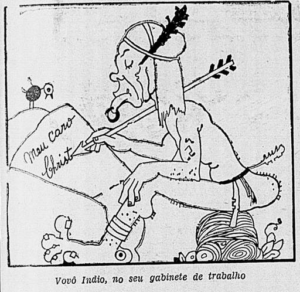Sometimes defenders of local culture have attempted to introduce well-meaning synthetic replacements for Santa Claus, with humorous and short-lived results. In the 1930s the Brazilian government, rocked by the impact of the Great Depression and impressed by the seeming success of Mussolini’s Italian fascism, turned inward and instituted policies that emphasized national self-sufficiency. Foreign goods and foreign ideas were rejected and replaced with local production and ideology. This encouraged an abortive move to replace Papai Noel, the local version of Santa, with Vovo Indio, or “Grandfather Indian”, meant to be an alternative to Euro-American gift-bringers and thus inflate Brazilian patriotic sentiments. Instead of a fat, fur-clad saint from the chilly north, Vovo Indio was the child of a black slave and an aboriginal mother, raised by a white family, and wearing only a feather head-dress and loin-cloth. Despite political backing by the President and fascist ultra-nationalists, Vovo Indio never caught on with the children of Brazil (in fact, he was perceived as rather frightening) and he soon returned to the jungle.
